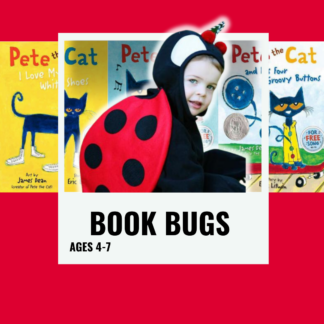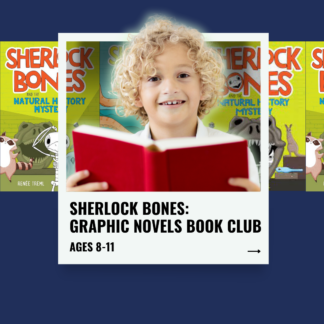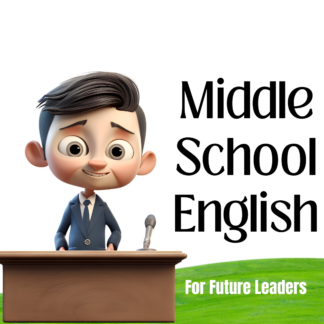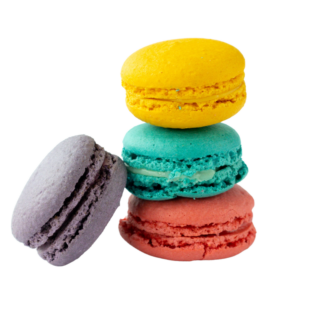Description
It’s an all-you-can-eat buffet of writing, reading, communication, thinking, and fun! Prepare your learners for the intense literary analysis requirements of high school English. After taking this class, all of their high school reading and writing will be easier because they will be equipped!
This ongoing class gives families the ultimate flexibility without compromising on the quality of education. We pack an academic punch in these once-weekly classes and keep them fun so students master skills. Students learn the foundation of literary analysis, critical reading, and organized writing.
Students master all of the essential English language arts content. We cover reading for all purposes, critical thinking, analysis, and writing in various genres: expository, argument, poetry, literary analysis, narratives, etc.
Each class meets once per week, and students have one piece of homework to complete each week. The teacher will give thorough and authentic feedback on the work so students can revise and edit. It’s easy for students to manage and parents to be a little more hands-off. We want students to start mastering these skills on their own. Further, students are expected to read 100 minutes per week. They may choose whatever they want to read, but we hold them accountable for that reading when the teacher asks each student to report on the book’s title and the student’s page number.
**EVERY LESSON HAS A COMPONENT OF READING, WRITING, & COMMUNICATION.**
A Snapshot of Each Class:
❶ We begin with grammar and sentence construction work so students learn to write correctly, succinctly, and artfully. Students report on their book and page number.
❷ Next, the instructor explicitly teaches a skill or concept. This direct instruction is supported by a large body of research for effective teaching. For example, when we teach how to make inferences, we teach them a two-step approach and break it down so students understand how to make inferences. It’s not magic! It’s a skill, and it’s teachable and learnable!
❸ Students can practice the skill or demonstrate understanding while getting feedback and guidance from the teacher through the chatbox or on a Google Document. In our example, students are given a video clip and a piece of writing to answer questions that require making inferences. These are short writing pieces.
❹ Finally, students can show their learning independently in their writing assignments.
??????????
?️ THE GRAND BUFFET: A YEAR OF ENGLISH LANGUAGE ARTS CONTENT:
**You can jump in and out of class as you’d like! When you see skills repeated, it means we do it two or three times with a different text. You do not have to have attended the week prior. The skills are taught each week. It’s just a hard skill to master.**
??????????
FIGURATIVE LANGUAGE:
We will literally teach students that saying “literally” all the time is literally not good. 😉 Students have a review of what figurative language is and why authors use it. We teach this to them in an understandable way! Then, students see examples of figurative language and identify it in a different text. After that, the teacher models how to write figuratively and then guides the students toward mastery until they do it themselves! It’s literally awesome.
? The week starting Aug 25: Simile
? The week starting Sept 1: Simile
? The week starting Sept 8: Metaphor
? The week starting Sept 15: Hyperbole
? The week starting Sept 22: Personification
? The week starting Sept 29: Idioms
? The week starting Oct 6: Onomatopoeia
? The week starting Oct 13: Alliteration, assonance
? The week starting Oct 20: Rhyme
? The week starting Oct 27: Symbolism. When students can identify an author’s use of symbolism, they can identify the theme of a work. We use film to teach them how to do this. They write in response!
? The week starting Nov 3: Symbolism. When students can identify an author’s use of symbolism, they can identify the theme of a work. We use film to teach them how to do this. They write in response!
CREATIVE WRITING:
?️ The week starting Nov 10: Poetry Analysis 1. Poetry does not need to be confusing and hard to understand. We teach a step-by-step approach to analyzing a poem to look at the layers of meaning.
? The week starting Nov 17: Poetry Analysis 2. Poetry does not need to be confusing and hard to understand. We teach a step-by-step approach to analyzing a poem to look at the layers of meaning.
? The week starting Nov 24: NO CLASS.
? The week starting Dec 1: Writing Suspense. We all know the tense feeling of reading or watching something suspenseful. The tension builds, and we start to feel more and more uncomfortable! Crafty authors know how to to this, relieving the tension at the right time, making the reading experience enjoyable. Students will learn how to do this and will write their own suspenseful passages.
LITERARY DEVICES:
? The week starting Dec 8: Dramatic Irony. In on a secret! Students learn dramatic irony is when they–as a reader or audience–are in on a secret that a character doesn’t know. This is used in scary narratives and in comedy. They look at examples and then practice writing their own passage, using dramatic irony OR an analytical piece.
? The week starting Dec 15: Dramatic Irony. In on a secret! Students learn dramatic irony is when they–as a reader or audience–are in on a secret that a character doesn’t know. This is used in scary narratives and in comedy. They look at examples and then practice writing their own passage, using dramatic irony OR an analytical piece.
? Dec 22 – Jan 4: NO CLASS
? The week starting Jan 5: Situational Irony. Everything is messed up! Students learn that situational irony happens when the situation is the opposite of what they would expect. This device is used in comedies a lot. They look at examples and then practice writing their own passage using situational irony OR an analytical piece.
? The week starting Jan 12: Situational Irony. Everything is messed up! Students learn situational irony is when the situation is the opposite of what they would expect. This device is used in comedies a lot. They look at examples and then practice writing their own passage using situational irony OR an analytical piece.
? The week starting Jan 19: Verbal Irony. Do you mean what you say? Students learn verbal irony is when the words spoken are the opposite of what they really mean. They look at examples and then practice writing their own passage using situational irony OR an analytical piece.
CHARACTER ANALYSIS:
? The week starting Jan 26: Character Analysis (external traits). Analyzing and evaluating characters is a foundational skill in literary analysis. We teach students how to analyze the external traits of characters and to synthesize those details with other important elements in the narrative. They learn how authors use external traits to point to theme. Their homework is to write an analytical piece.
? The week starting Feb 2: Character Analysis (internal traits). Analyzing and evaluating characters is a foundational skill in literary analysis. We teach students how to analyze the internal traits of characters using a step-by-step approach. Their homework is to write an analytical piece.
? The week starting Feb 9: Protagonist & Antagonists. Types & Tropes. Analyzing and evaluating characters is a foundational skill in literary analysis. Students learn the different types of protagonists, building a foundation of literary analysis that will be applied in upper secondary English classes.
PROTAGONIST TYPES:
? The week starting Feb 16: The Hero
? The week starting Feb 23: The Anti-Hero
? The week starting Mar 2: The Tragic hero
? The week starting Mar 9: The Average Joe
ANTAGONIST TYPES:
? The week starting Mar 16: Villains
? The week starting 23: Conflict Creators
? The week starting Mar 30: Group Antagonists
OTHER CHARACTER TYPES:
? The week starting Apr 6: Underdogs
? The week starting Apr 13: Round & Dynamic vs. Flat & Static Characters
? The week starting Apr 20: Foil Characters
LITERARY CONFLICT:
Students learn the different categories of conflict used in narratives so they are able to analyze and evaluate an author’s use of conflict in a literary text.
? The week starting Apr 27: External & Internal
? The week starting May 4: External–character vs character
?The week starting May 11: External–character vs nature
? The week starting May 18: External–character vs society
? The week starting May 25: Making Inferences in film and comics. Students learn to make inferences, a reading skill necessary for academic success. Students will use a two-step process to infer meaning from a comic strip, a video clip, and a short text.
? The week starting June 1: Making Inferences in text. Making Inferences in film and comics. Students learn to make inferences, a reading skill necessary for academic success. Students will use a two-step process to infer meaning from a comic strip, a video clip, and a short text.
? The week starting June 8: Narrative Writing-How to Write an Exposition (the beginning of a story). After a lesson on writing dialogue and descriptive writing with a mythological monster, the authors write about a hero who sets out on a quest. They learn to build suspense and blend narrative elements.
? The week starting June 15: Narrative Writing-How to Write Conflict. It’s a Monster Battle! Students learn to build suspense and blend narrative elements as they have a hero battle two more mythological monsters. Scylla and Charybdis are sea monster that loves to feast on heroes. Learners will learn to write action and how to blend that with other literary elements in an epic Greek battle. Attendance in last week’s class is not required to attend this class!
? The week starting June 22: Narrative Writing–How to Resolve Conflict. All quests come to an end, and students will write a homecoming! Attendance in last week’s class is not required to attend this class. Students learn to resolve conflict in their writing in a satisfying way.
RESEARCH & WRITING
? The week starting June 29: How to Research. Students learn the steps of research, how to be organized, choose a topic, and search smart to find resources. For homework, they find their resources and read them. They are guided to find kid-friendly resources, and the teacher gives them one of their three articles.
? The week starting July 6: How to Paraphrase and Cite Sources. Students learn how to read their articles, annotate them, and then take notes to avoid plagiarism. Finally, they learn how to paraphrase a nonfiction article. For homework, they write a paraphrase of three informational articles. Attendance in last week’s class is not required to attend this class.
? The week starting July 13: How to elaborate. Students learn different elaboration techniques to expand on what they may have already written. For homework, they revise body paragraphs with the elaboration techniques they learned. Attendance in last week’s class is not required to attend this class.
? The week starting July 20-: How to write an Introduction. They learn how to hook their reader, write a thesis statement, and bridge the gap between the hook and thesis.
? The week starting July 27: How to write a Conclusion. Students learn to restate their thesis and their main ideas but in a unique way. Then they leave their reader thinking with final words.
? The week starting Aug 3: Close Reading–annotating, taking notes, and paraphrasing. Paraphrasing a text in your own words is difficult if you don’t understand it! This class will teach a strategic approach to a text, whether the subject matter is science, history, or another topic, so you can understand what you are reading. After you know it, you can paraphrase the content into your own words, demonstrating your understanding and thinking.
? The week starting Aug 10: Close Reading–annotating, taking notes, and paraphrasing. Paraphrasing a text in your own words is difficult if you don’t understand it! This class will teach a strategic approach to a text, whether the subject matter is science, history, or another topic, so you can understand what you are reading. After you know it, you can paraphrase the content into your own words, demonstrating your understanding and thinking.
? The week starting Aug 17: Close Reading–annotating, taking notes, and paraphrasing. Paraphrasing a text in your own words is difficult if you don’t understand it! This class will teach a strategic approach to a text, whether the subject matter is science, history, or another topic, so you can understand what you are reading. After you know it, you can paraphrase the content into your own words, demonstrating your understanding and thinking.
To explore other available courses, please click here.





